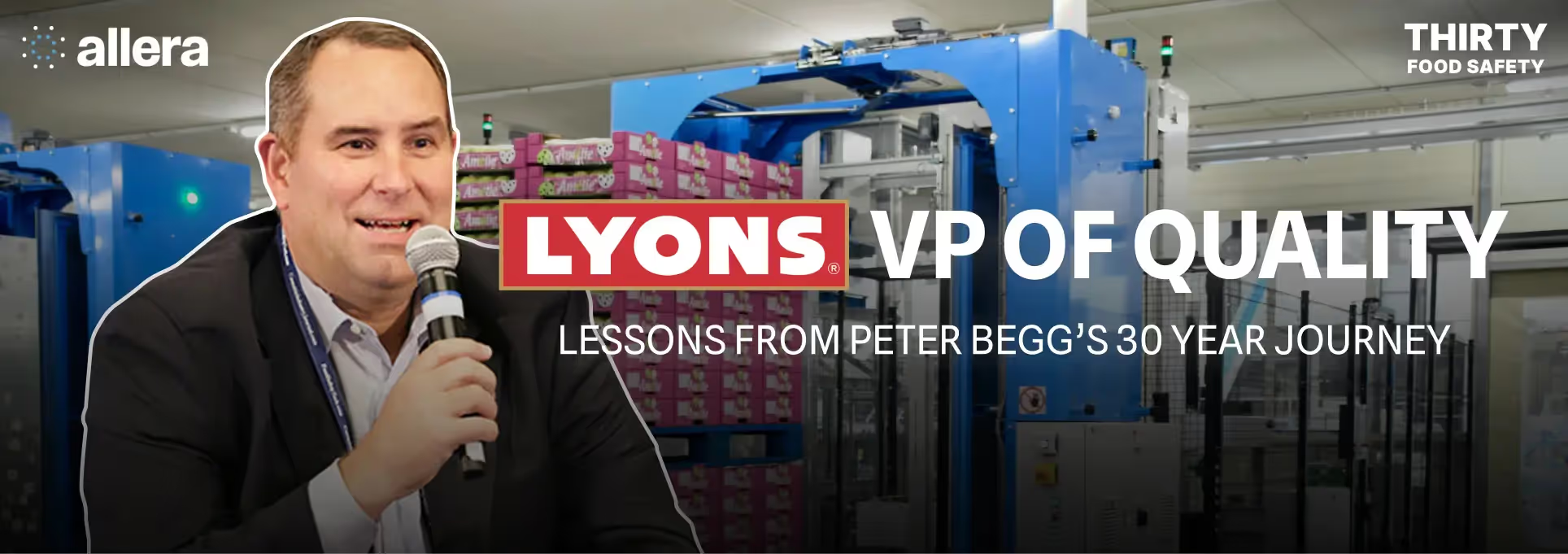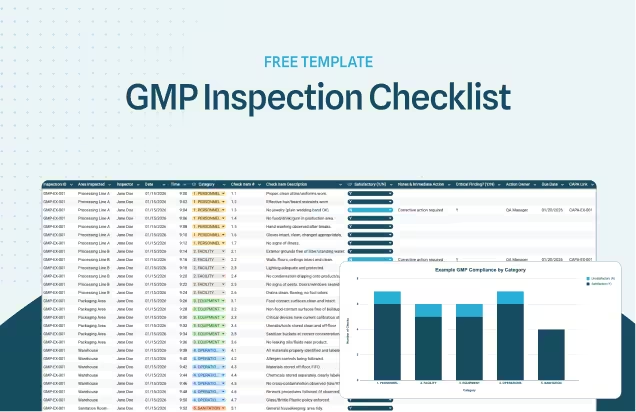

From Process Engineer to Food Safety VP: Peter Begg's 30-Year Journey

Not many chemical engineers from Penn State end up running food safety for major corporations, but Peter Begg's unconventional path reveals powerful lessons about building careers, teams, and safety cultures in an industry where stakes couldn't be higher.
In a recent 30 Food Safety interview, Begg shared his journey from Kraft Foods process engineer to VP of Quality at Lyons Magnus, offering hard-won insights about moving from reactive to proactive food safety, building culture, and why standing your ground matters more as you climb the ladder.
The Accidental Beginning: When Companies Force Learning
Begg's entry into food safety wasn't by choice—it was by corporate mandate. At the "OG Kraft" in the early 1990s, every employee involved with manufacturing operations had to take microbiology and food safety courses, regardless of their role.
"It did not matter. If you were coming into the company, they made you learn about food safety," Begg recalls.
This wasn't arbitrary policy. Following a mid-1980s Listeria recall on ice cream novelty bars that caused illnesses, Kraft transformed their entire approach. The message was clear: everyone touches food safety, so everyone needs to understand it.
While many engineers might have seen this as box-checking, Begg found something that clicked with his problem-solving mindset.
The Hook: Real-Time Problem Solving
What kept Begg engaged when many of his engineering peers returned to their traditional roles? The pace and variety.
"As an engineer, I think about solving problems. And every day, in quality and food safety, there's a problem," he explains. "In quality and food safety, it is real time and it's fast moving."
Compared to year-long engineering projects with their inevitable waiting periods, food safety offered constant, immediate challenges that demanded quick thinking and decisive action.
The Unconventional Advantage: Bringing Business Thinking to Food Safety
Begg's engineering background created an unexpected superpower in food safety leadership: balancing technical rigor with business reality.
"You still have to do the right thing for the consumer, but also the right thing for the business," he notes. "Food safety is not negotiable, but when you come to quality, now you have decisions to make."
This perspective proved crucial during his international assignment leading quality for Kraft Europe, where he navigated the integration of the LU Biscuit business and the Cadbury acquisition—expanding his team from 25 to 100 people while managing the unique risks of chocolate manufacturing.
The Chocolate Challenge: When Water Isn't the Answer
One of Begg's most memorable lessons came during a potential Salmonella situation in chocolate production. The solution revealed how food safety expertise goes far beyond general principles.
"You can't clean chocolate with water. You gotta use hot oil to clean all the pipes and things like that and flush all the lines. And then you use some sort of abrasive like sugar to make sure everything's clean."
The experience reinforced a crucial leadership principle: know what you don't know, and rely on the experts.
"I'm not the expert in microbiology, but that's okay. I know where the experts are," Begg reflects.
The Leadership Evolution: From Pushing Up to Standing Ground
Perhaps Begg's most valuable insight concerns how food safety leadership changes as you advance in your career.
Early in his career, he would identify problems and push them up the chain, hoping others would drive necessary changes. Now, as a VP reporting directly to the CEO, he's learned the buck stops with him.
"At some point in your career, when you get to certain roles, it's you. There's no one else who you can go tell to, hey, can you go get this done for me or can you push this forward."
His advice for future leaders:
"Standing your ground being probably more vocal about like hey here's the absolute things we need to do."
The Proactive Challenge: Moving Beyond Crisis Response
Begg's biggest frustration—and his main mission at Lyons Magnus—is moving the industry from reactive to proactive food safety management.
"We tend to be very reactive in food safety and quality," he observes. "A crisis happens and all of a sudden a company... [throws] a whole ton of resources... but we need to be doing that ahead of time."
At Lyons Magnus, this philosophy drives everything from culture building to capital planning. They've created an asset replacement list identifying equipment with food safety risk potential, getting them into capital plans before problems emerge.
Building Food Safety Culture: Beyond the Buzzword
Culture building is "the buzzword," Begg acknowledges, "but it's easy to say, let's build a culture, it's hard to actually do."
At Lyons Magnus, they've made it tangible with their "Safety: The Heart of Our Pride" initiative (a play on the company's lion imagery). But the real test came when an employee recently spotted the wrong ingredient being brought to the production floor.
"We celebrated that because that's what you want. That's the type of culture you want is where people are being proactive."
The Hall of Fame Moment: Transforming the "Worst Audit Ever"
Begg's proudest achievement happened at Mondelez, turning around a factory in India that had:
"literally... one of the worst audits I had ever seen."
The transformation took cross-functional partnership, unwavering leadership support, and a refusal to accept excuses. Three years later, the same facility earned ratings comparable to the company's best factories worldwide.
The formula:
"People, programs, and culture. If you get all three of those right, you can build a really strong organization around food safety."
Hot Take: AI Won't Solve Everything (But It Will Help)
While AI dominates industry headlines, Begg offers a measured perspective on its food safety applications.
"It can help maybe tell you the right time to plant the crops and maybe the right location and all that, but you're still dealing with nature, you're still dealing with agriculture, and then you still need people to harvest those."
Where he does see value: data analysis and aggregation.
"Using AI to help you wade through all that to really get at like are there things I'm missing... that's where I see benefits from it."
What Keeps Him Up at Night
Two things consistently worry Begg:
- Inherent product risks: "Microorganisms don't care who you are. They're going to find their way if you don't take the right steps to mitigate them."
- Talent retention: "People are still at the heart of what we do and making sure that you can retain your talent is probably the other thing that keeps me up at night."
Advice for the Next Generation
Begg's counsel is refreshingly practical:
Do what you love:
"If you're waking up and you're dreading going to work... you're probably not in the right role."
Try different things: His chemical engineering background made him a better food safety leader.
"Having a couple of different experiences in your career... will just help you that much better is a leader later on."
The Bottom Line
Peter Begg's journey from process engineer to food safety executive proves that the best leaders often come from unexpected places. His story shows that technical expertise matters, but business acumen and leadership courage matter more. Most importantly, it demonstrates that in food safety, the transition from reactive to proactive isn't just about better systems—it's about better leadership willing to stand ground when it matters most.
In an industry where yesterday's crisis drives today's investment, leaders like Begg are working to flip that script, one proactive decision at a time.
.avif)





.avif)


.avif)
.avif)

